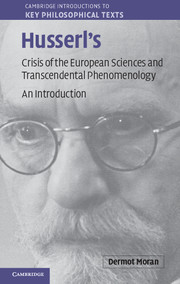Book contents
- Frontmatter
- Contents
- Acknowledgements
- Abbreviations
- Introduction
- Chapter 1 Husserl’s life and writings
- Chapter 2 Husserl’s Crisis
- Chapter 3 Galileo’s revolution and the origins of modern science
- Chapter 4 The crisis in psychology
- Chapter 5 Rethinking tradition
- Chapter 6 Husserl’s problematical concept of the life-world
- Chapter 7 Phenomenology as transcendental philosophy
- Chapter 8 The ongoing influence of Husserl’s Crisis
- Bibliography
- Index
- References
Chapter 6 - Husserl’s problematical concept of the life-world
Published online by Cambridge University Press: 05 November 2012
- Frontmatter
- Contents
- Acknowledgements
- Abbreviations
- Introduction
- Chapter 1 Husserl’s life and writings
- Chapter 2 Husserl’s Crisis
- Chapter 3 Galileo’s revolution and the origins of modern science
- Chapter 4 The crisis in psychology
- Chapter 5 Rethinking tradition
- Chapter 6 Husserl’s problematical concept of the life-world
- Chapter 7 Phenomenology as transcendental philosophy
- Chapter 8 The ongoing influence of Husserl’s Crisis
- Bibliography
- Index
- References
Summary
In Husserl’s later work the magic word Lebenswelt (lifeworld) appears – one of those rare and wonderful artificial words (it does not appear before Husserl) that have found their way into the general linguistic consciousness, thus attesting to the fact that they bring an unrecognized or forgotten truth to language. So the word ‘Lebenswelt’ has reminded us of all the presuppositions that underlie all scientific knowledge.
(Hans-Georg Gadamer)The Life-World as Universal Problem
In this chapter I shall attempt to draw together Husserl’s diffuse remarks about the life-world (primarily in Crisis §§ 33–8, 43 and 51) into a coherent exposition of this influential but ultimately problematic concept. The life-world, in Husserl’s hands, is a rich, multi-faceted notion with some apparently paradoxical or even contradictory features that have puzzled even sympathetic commentators.
Husserl’s Crisis became famous for its extensive yet somewhat formal treatment of the concept of the ‘life-world’ or ‘world of life’ (Lebenswelt) – at least in his main published works – life-world is mentioned briefly in Cartesian Meditations § 58. It is in the Crisisthat Husserl claims to have discovered the life-world as a fundamental and novel phenomenon previously invisible to the sciences and to have identified it for the first time as a ‘universal problem’ (Crisis § 34). Indeed, there is – as Husserl himself insists – a specific and entirely new science of the life-world itself (Crisis § 51) that would, among other things, offer a new basis for grounding the natural and human sciences. There has never been such an investigation of the ‘life-world’ as ‘subsoil’ (Untergrund) for all forms of theoretical truth (C 124; K 127).
- Type
- Chapter
- Information
- Husserl's Crisis of the European Sciences and Transcendental PhenomenologyAn Introduction, pp. 178 - 217Publisher: Cambridge University PressPrint publication year: 2012
References
- 1
- Cited by



